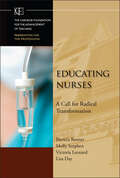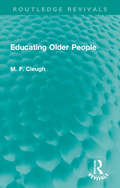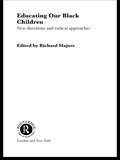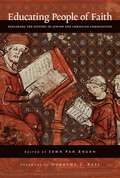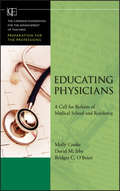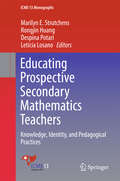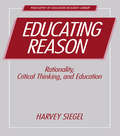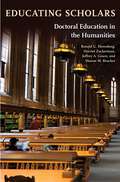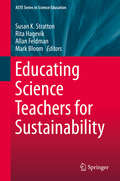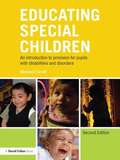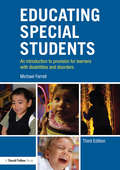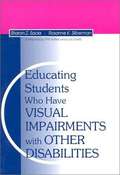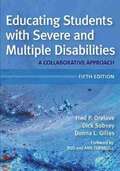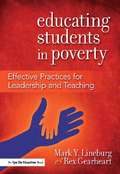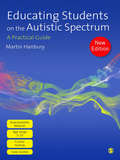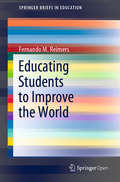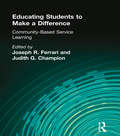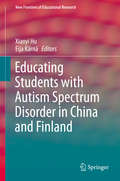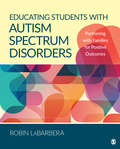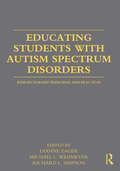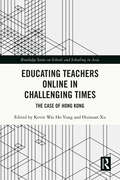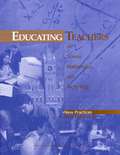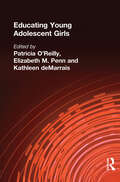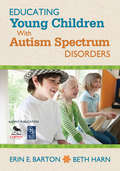- Table View
- List View
Educating Nurses: A Call for Radical Transformation
by Patricia Benner Lee S. Shulman Molly Sutphen Lisa Day Victoria LeonardSince the last national nursing education study forty years ago, profound changes in science, technology, patient activism, the market-driven health care environment, and the nature of nursing practice have all radically transformed nursing education. Educating Nurses, part of the Preparation for the Professions series from the Carnegie Foundation for the Advancement of Teaching, explores key issues for the future of the field as well as recommendations for revolutionary changes for administrators and faculty in nursing schools and programs.
Educating Older People (Routledge Revivals)
by M. F. CleughOriginally published in 1962, the purpose of this book was to examine the working of the educative process when it is concerned with older people; not with children, prisoners, willing or unwilling, of a system of basic education, but voluntary contractors; not green, pliable saplings, but sturdy and sometimes unbending timber – in short, adults with an outlook on life already formed, often with family responsibilities, and with a store of past experience, special interests, training, or expertise. The teaching of older people does not consist merely of the adaptation of the methods applicable to school or college to the intellectual level of those to whom time and opportunity may have given an already broad understanding, theoretical or empirical, of a variety of subjects. The teaching of adults must take full account of method, but whatever the context, is also much concerned with the interrelations between individuals in groups, and with changes in the individuals themselves. For the adult, in the main, the purpose of education is improvement; this may imply a feeling of dissatisfaction with standards already achieved or a strong determination to reach new educational goals for specific reasons connected with status or advancement. These factors often bring with them into the setting of the adult class anxieties, tensions, feelings of inadequacy, or burdens of responsibility that overshadow the learning process because of the importance of the outcome. Habits and attitudes may already have been formed that stand in the way of assimilating new patterns and techniques of learning. This book is concerned with the social and psychological factors of which account must be taken in approaching the teaching of adults. It considers methods of teaching and of learning, and proceeds to inquire into the deeper attitudinal influences at work, both in the teacher and in the student. Throughout the book theory is illustrated by the liberal use of examples. The author has also attempted to go beyond the particular to the general and to discuss the issues and principles that apply over a wide field of education and indeed of management. Thus the scope and usefulness of the book are not confined solely to the tutorial situation, but extend to those fields in which problems of group relations and leadership are to be found within the context of training or of management.
Educating Our Black Children: New Directions and Radical Approaches
by Richard MajorsExclusion and miseducation of black children is endemic in the US and UK. This book takes a long, hard look at the two countries and uncovers what they can learn from each other in their approaches to tackling this problem. The material in the book is the result of extensive work with educators, researchers and scholars working in the area of education and disaffection in the US and the UK.Richard Majors and his contributors are at the vanguard of research into this topic and this book is one of the most important titles published on the education of black children in recent times.Gathering together the issues and looking at real-world approaches, this book does not simply advance the debate: it tables some serious solutions to serious problems.This is a ground-breaking book based on cutting-edge research from writers and experts recognised the world over for their expertise. People will take note of what this book has to say.
Educating People of Faith: Exploring the History of Jewish and Christian Communities
by John H. Van EngenA much-needed addition to the emerging literature on the formative power of religious practices, Educating People of Faith creates a vivid portrait of the lived practices that shaped the faith of Jews and Christians in synagogues and churches from antiquity up to the seventeenth century.This significant book is the work of Jewish, Roman Catholic, Orthodox, and Protestant scholars who wished to discover and describe how Jews and Christians through history have been formed in religious ways of thinking and acting. Rather than focusing solely on either intellectual or social life, the authors all use the concept of "practices" as they attend to the embodied, contextual character of religious formation. Their studies of religious figures, community life, and traditional practices such as preaching, sacraments, and catechesis are colorful, detailed, and revealing. The authors are also careful to cover the nature of religious education across all social levels, from the textual formation of highly literate rabbis and monks engaged in Scripture study to the local formation of illiterate medieval Christians for whom the veneration of saints' shrines, street performances of religious dramas, and public preaching by wandering preachers were profoundly formative.Educating People of Faith will benefit scholars and teachers desiring a fuller perspective on how lived practices have historically formed people in religious faith. It will also be useful to practical theologians and pastors who wish to make the resources of the past available to practitioners in the present.
Educating Physicians
by Lee S. Shulman Bridget C. O'Brien Molly Cooke David M. IrbyEmerging from a study of physician education by the Carnegie Foundation for the Advancement of Teaching, Educating Physicians calls for a major overhaul of the present approach to preparing doctors for their careers. The text addresses key issues for the future of the field and takes a comprehensive look at the most pressing concerns in physician education today. Like the Carnegie Foundation's revolutionizing Flexner Report of 1910, Educating Physicians is destined to change the way administrators and faculty in medical schools and programs prepare their physicians for the future.
Educating Prospective Secondary Mathematics Teachers: Knowledge, Identity, And Pedagogical Practices (ICME-13 Monographs)
by Marilyn E. Strutchens Rongjin Huang Leticia Losano Despina PotariThis book highlights innovative approaches to preparing secondary mathematics teachers. Based on empirical findings gathered in several countries on five continents, it provides a wealth of best practices for preparing secondary mathematics teachers, and discusses issues related to their professional and personal growth, such as identity, content knowledge, and pedagogical content knowledge which also includes knowledge of integrating technology into teaching and learning mathematics. Divided into four parts, the book focuses on field experiences, technologies, tools and resources, teacher knowledge, and teacher professional identities. Some of the main threads running through the book are: the importance of university and school partners working together to ensure preservice secondary mathematics teacher’ success in developing pedagogical strategies that lead toward students’ mathematical engagement and achievement; the critical need for preservice secondary mathematics teachers to develop strong content knowledge and pedagogical content knowledge; and the importance of providing opportunities, during pre-service education, for developing prospective teachers ´professional identities.
Educating Reason
by Harvey SiegelFirst Published in 1988. Routledge is an imprint of Taylor & Francis, an informa company.
Educating Scholars: Doctoral Education in the Humanities
by Ronald G. Ehrenberg Harriet Zuckerman Jeffrey A. Groen Sharon M. BruckerMeeting the challenges faced by today's U.S. doctoral humanities programsDespite the worldwide prestige of America's doctoral programs in the humanities, all is not well in this area of higher education and hasn't been for some time. The content of graduate programs has undergone major changes, while high rates of student attrition, long times to degree, and financial burdens prevail. In response, the Andrew W. Mellon Foundation in 1991 launched the Graduate Education Initiative (GEI), the largest effort ever undertaken to improve doctoral programs in the humanities and related social sciences. The only book to focus exclusively on the current state of doctoral education in the humanities, Educating Scholars reports on the GEI's success in reducing attrition and times to degree, the positive changes implemented by specific graduate programs, and the many challenges still to be addressed.Over a ten-year period, the Foundation devoted almost eighty-five million dollars through the GEI to provide support for doctoral programs and student aid in fifty-four departments at ten leading universities. The authors examine data that tracked the students in these departments and in control departments, as well as information gathered from a retrospective survey of students. They reveal that completion and attrition rates depend upon financial support, the quality of advising, clarity of program requirements, and each department's expectations regarding the dissertation. The authors consider who earns doctoral degrees, what affects students' chances of finishing their programs, and how successful they are at finding academic jobs.Answering some of the most important questions being raised about American doctoral programs today, Educating Scholars will interest all those concerned about our nation's intellectual future.
Educating Science Teachers for Sustainability
by Susan K. Stratton Rita Hagevik Allan Feldman Mark BloomThis volume contains a unique compilation of research and reflections representing multiple vantage points stemming from different parts of the world that can help science educators and teacher educators in finding ways to meaningfully and purposefully embed sustainability into teaching and learning. It is a rich resource for exploring and contextualizing sustainability-oriented science education. At this time we find ourselves in a situation in which the earth's ecological system is under significant strain as a result of human activity. In the developed world people are asking "How can we maintain our current standard of living?" while those in the developing world are asking "How can we increase the quality of our lives?" all while trying to do what is necessary to mitigate the environmental problems. This volume responds to these questions with a focus on educating for sustainability, including historical and philosophical analyses, and pedagogical and practical applications in the context of science teacher preparation. Included are many examples of ways to educate science teachers for sustainability from authors across the globe. This text argues that issues of sustainability are increasingly important to our natural world, built world, national and international economics and of course the political world. The ideas presented in the book provide examples for original, effective and necessary changes for envisioning educating science teachers for sustainability that will inform policy makers.
Educating Special Children: An introduction to provision for pupils with disabilities and disorders
by Michael FarrellEducating Special Children is the definitive guide to evidence-based practice and professionally informed approaches in provision for special children. Now in its second edition, this book outlines ideas of best practice that relate to various disabilities and disorders and helpfully discusses what might constitute effective provision. International in its scope, it explores issues surrounding: communication disorders and autism and Asperger's Syndrome developmental co-ordination disorders reading, writing and mathematics disorders disorders of conduct, anxiety and depression attention deficit hyperactivity disorder mild, moderate to severe, and profound cognitive impairment sensory impairments orthopaedic and motor disabilities, health impairments and traumatic brain injury. This new edition has also been updated to cover: entitlement to special education global examples of distinctive provision raising standards in your setting basic brain anatomy and physiology 'thinking points' and further reading list for reflection. Educating Special Children will be of interest to all students of special education, professionals and others interested in gaining an understanding in the challenging field of offering provision for special children.
Educating Special Students: An introduction to provision for learners with disabilities and disorders
by Michael FarrellEducating Special Students is the definitive guide to evidence based practice and professionally informed approaches to provision for special students. Now in its third edition, the book sets out ideas of best practice relating to different disabilities and disorders, helpfully discussing what might constitute effective provision. This edition has been updated to take account of new ways of classifying disabilities and disorders, and recent developments in research and practice, including the 2014 SEND Code of Practice (England) and the Diagnostic and Statistical Manual of Mental Disorders Fifth Edition DSM-5TM. A new appendix provides information on basic anatomy and physiology. International in scope, the book explores issues relating to: intellectual disability (profound, moderate to severe, and mild) sensory impairments orthopaedic impairment and motor disorders, health impairments, and traumatic brain injury oppositional defiant disorder, conduct disorder, anxiety disorders, depressive disorders, and attention deficit hyperactivity disorder communication disorders (speech, grammar and comprehension, semantics and pragmatics), and autism spectrum disorder specific learning disorders with impairment in reading, written expression and mathematics, and developmental co-ordination disorder. Educating Special Students will be of interest to all those studying special education, professionals, and others committed to seeking the best provision for special students.
Educating Students Who Have Visual Impairments With Other Disabilities
by Sharon Sacks Rosanne K. SilbermanWith a concentration on education needs, learning styles, and recommended classroom practices, this introductory text demonstrates functional assessment and teaching adaptations that improve inclusive learning experiences for students with a wide range of visual impairments and multiple disabilities.
Educating Students With Severe And Multiple Disabilities: A Collaborative Approach
by Dick Sobsey Fred P. Orelove Donna GillesA cornerstone of special education training for 30 years, this is the definitive textbook for preparing educators, counselors, and other related services professionals to teach children with severe and multiple disabilities in inclusive settings. Now in a revised, thoroughly updated, and streamlined fifth edition, this bestselling volume gives current and future educators the research and practical strategies they need to ensure the best learning outcomes for their students. Presenting a team-based, collaborative approach to education, this comprehensive text includes valuable contributions from respected experts in diverse fields, including fresh voices in special education, physical therapy, occupational therapy, communication, counseling, and pediatrics. Equally useful for preservice professionals and practicing educators in inclusive classrooms, this highly regarded textbook will fully prepare professionals to meet the educational, emotional, and health care needs of students with severe and multiple disabilities.
Educating Students in Poverty: Effective Practices for Leadership and Teaching
by Mark Lineburg Rex GearheartTackling a growing challenge in today’s schools, experienced educators Lineburg and Gearheart present an honest picture of how poverty affects students, families, and the school community at large. They offer a host of practical applications that can be used in every school district in America to meet those challenges head-on! Written for preK–12 teachers, leaders, and staff, Educating Students in Poverty provides essential strategies to help socioeconomically disadvantaged students achieve academic and lifelong success. Backed up with firsthand experiences and relevant research, these proactive instructional and administrative approaches cover a variety of topics, including: Advocating for underprivileged students Improving school climate and culture Engaging and communicating with families Instructional techniques and discipline issues Student health and safety This book is a must-have resource for any educator whose goal is to maximize the learning potential of every student.
Educating Students on the Autistic Spectrum: A Practical Guide
by Dr Martin HanburyThe aim of this book is to make sure all students on the Autistic Spectrum are given the opportunity to engage in appropriate teaching and learning experiences. It considers the individual with autism, and offers tried and tested approaches that have worked, giving background information on autism and its impact on the learner. In this new edition, the author has added: - more information on sensory issues - an increasingly holistic view of the student with autism - new ideas for curriculum planning in mainstream settings - advice on multi-professional working - guidance on developing positive working relationships with parents and carers There is a wealth of new electronic material available to download from the SAGE website, including photocopiable materials, PowerPoint presentations and checklists. A must-have resource for all practitioners working with children and young people on the autistic spectrum, this book will improve your inclusive practice and ensure positive outcomes for these children.
Educating Students to Improve the World (SpringerBriefs in Education)
by Fernando M. ReimersThis open access book addresses how to help students find purpose in a rapidly changing world. In a probing and visionary analysis of the field of global education Fernando Reimers explains how to lead the transformation of schools and school systems in order to more effectively prepare students to address today’s’ most urgent challenges and to invent a better future. Offering a comprehensive and multidimensional framework for designing and implementing a global education program that combines cultural, psychological, professional, institutional and political perspectives the book integrates an extensive body of empirical literature on the practice of global education. It discusses several global citizenship curricula that have been adopted by schools and school networks, and ties them into an approach to lead school change into the uncharted territory of the future. Given its scope, the book will help teachers, school and district leaders tackle the change management needed in order to introduce global education, and more generally increase the relevancy of education. In addition, the book offers a “bridge” for more productive collaboration and communication between those who lead the process of educational change, and those who study and theorize this important work.At a time when the urgency of our shared global challenges calls for more understanding and collaboration and when the rapid transformation of societies requires that we help students develop a clear sense of relevancy and purpose, this book offers a way to pursue deep and sustainable change in instruction and school culture, so that students learn that nothing human is foreign and that they can find meaning in lives aligned with audacious purposes to make the world better.
Educating Students to Make a Difference: Community-Based Service Learning
by Joseph R Ferrari Judith G ChapmanEducating Students to Make-a-Difference covers a range of issues related to service learning, addressing the “who,” “why,” and “so what” of service-learning experiences. It provides information that will aid in the development of service-learning programs and courses.The in-depth studies on student volunteerism found in this book will show you how incorporating student service objectives into your curriculum can improve your students’self-esteem and school involvement, as well as alleviate depression and problem behavior. Educating Students to Make-a- Difference will enhance your knowledge and understanding of volunteerism and its many benefits, showing you how to ignite the volunteer in each of your students. By encouraging volunteerism, you’ll increase your students’problem-solving and leadership skills, as well as their awareness of social issues, and see the positive impact service learning has on students, faculty and the community. Educating Students to Make-a-Difference gives qualitative and quantitative assessments of attributes that predict volunteerism in student populations and the social values that are developed or enhanced as a consequence of service-learning experiences. You’ll learn about student predispositions and motivations for community service across a variety of student populations. In addition to promoting moral and social values, service-learning opportunities present educational benefits as well as benefits to personal and professional growth. You will see this as the book explores: the “who”, “why”, and “so what” of service learning educational benefits of service-learning opportunities self-esteem and self-efficacy faculty benefits comparisons between volunteers and nonvolunteers motivations and predispositions for student volunteerism selection and retention of student volunteersYour colleagues will want to borrow your syllabus after seeing the results of your new community service incorporated class material. Educating Students to Make-a-Difference gives you the insight on student patterns and volunteerism and data to service learning activities that enhance your students’educational experiences.
Educating Students with Autism Spectrum Disorder in China and Finland (New Frontiers of Educational Research)
by Xiaoyi Hu Eija KärnäThis book addresses the difficult challenges that children with autism present educators. By comprehensively examining the scientific knowledge underlying educational practices, programs and strategies in China and Finland, it provides valuable information for parents, administrators, researchers, and policy makers. This book examines the following fundamental issues related to the education of children with autism: •How children's specific diagnoses should affect educational assessment and planning •How we can support the families of children with autism •Features of effective instructional and comprehensive programs and strategies •How we can better prepare teachers, school staff, professionals and parents when it comes to educating children with autism •What policies at the national and local levels will best ensure appropriate education, examining strategies and resources needed to address the rights of children with autism to appropriate education
Educating Students with Autism Spectrum Disorders: Partnering with Families for Positive Outcomes
by Robin L. LaBarberaEducating Students with Autism Spectrum Disorders: Partnering with Families for Positive Outcomes focuses on practical strategies for educating children with autism spectrum disorders in the classroom. Additional features describe how to partner with families in the implementation of many of the strategies, giving voice to parents, based on recent quantitative and qualitative research. Case studies developed from real interviews with parents and educators open each chapter, and the book focuses on what "works" and what "does not work" in their collaborative experiences.
Educating Students with Autism Spectrum Disorders: Partnering with Families for Positive Outcomes
by Robin L. LaBarberaEducating Students with Autism Spectrum Disorders: Partnering with Families for Positive Outcomes focuses on practical strategies for educating children with autism spectrum disorders in the classroom. Additional features describe how to partner with families in the implementation of many of the strategies, giving voice to parents, based on recent quantitative and qualitative research. Case studies developed from real interviews with parents and educators open each chapter, and the book focuses on what "works" and what "does not work" in their collaborative experiences.
Educating Students with Autism Spectrum Disorders: Research-Based Principles and Practices
by Michael L. Wehmeyer Richard L. Simpson Dianne ZagerSimilar to a handbook in its comprehensive description of the theory and research supporting current practices in the treatment of autism spectrum disorders, this interdisciplinary text shows how the existing knowledge base can be used to explore promising new possibilities related to the field’s many unanswered questions. Key features include the following: Comprehensive – This is the first book to consider the history and current state of autism as a field in transition, to cover its varied approaches and philosophies, and to describe the interventions used throughout the developmental cycle. Cross Disciplinary – Serving students with autism necessitates communication and collaboration among professionals from several disciplines as well as family members. The editors have, therefore, brought together divergent perspectives, theories and philosophies in order to demonstrate that scientific evidence, rather than educational orientation, must determine which practices should be selected for use in particular situations. Research Based – Whereas many existing texts advocate a particular type of treatment, this one recognizes that interventions must be selected and evaluated based on the scientific evidence of their effectiveness. Integrated Methodology –Chapter authors consider findings from studies that employed single-subject designs, experimental large-scale studies, and qualitative methodology. The inter-relatedness of therapies and disciplines will be highlighted throughout. Expertise – The volume editors are all highly visible researchers in autism and developmental disabilities. Likewise, each chapter is directed by a senior, highly accomplished author who is nationally recognized for his/her work in the topic being addressed. This book is appropriate for practicing professionals in education and psychology and for speech/language therapists and other clinicians. It is also suitable as a graduate level text in these fields.
Educating Teachers Online in Challenging Times: The Case of Hong Kong (Routledge Series on Schools and Schooling in Asia)
by Yung, Kevin Wai Ho Huixuan XuThis edited collection documents the challenges experienced by teacher educators, in-service teachers and student teachers in Hong Kong triggered by protests, civil unrest and the global outbreak of the COVID-19 pandemic, and identifies innovative practices in curriculum, pedagogy and assessment that have enabled them to overcome the challenges in online teaching. It offers implications for teacher professional development through reflective practices and the enhancement of the scholarship of teaching and learning in the teacher education sector in Hong Kong and beyond. Teaching and learning in various education sectors in Hong Kong experienced unprecedented challenges starting in late 2019. The suspension of face-to-face teaching resulted in the reliance on e-technology and online teaching and learning. Many teachers and students felt unprepared and thus experienced emotional distress. However, the challenges opened up opportunities for teacher educators to revamp their instructional and assessment practices to cater for students’ learning needs in the online environment. The chapters are split into five sections, covering the situation of teacher education in challenging times, stakeholders’ experiences and challenges in teaching and learning, curriculum and pedagogical innovations, assessment and feedback practices and finally scholarship of teaching and learning. The book will be of particular interest to those who are committed to professional development through strengthening their reflective practice, online teaching and the scholarship of teaching and learning. It will also be an ideal text for education scholars and postgraduate students in curriculum planning, innovative online pedagogies and assessment practices in teacher education and the broader higher education context.
Educating Teachers of Science, Mathematics, and Technology: New Practices for the New Millenium
by Committee on Science Mathematics Teacher PreparationEach new headline about American students' poor performance in math and science leads to new calls for reform in teaching. Education Teachers of Science, Mathematics, and Technology puts the whole picture together by synthesizing what we know about the quality of math and science teaching, drawing conclusions about why teacher preparation needs reform, and then outlining recommendations for accomplishing the most important goals before us.As a framework for addressing the task, the book advocates partnerships among school districts, colleges, and universities, with contributions from scientists, mathematicians, teacher educators, and teachers. It then looks carefully at the status of the education reform movement and explores the motives for raising the bar for how well teachers teach and how well students learn.Also examined are important issues in teacher professionalism: what teachers should be taught about their subjects, the utility of in-service education, the challenge of program funding, and the merits of credentialing. Professional Development Schools are reviewed and vignettes presented that describe exemplary teacher development practices.
Educating Young Adolescent Girls
by Kathleen B. DeMarrais Elizabeth M. Penn Patricia O'ReillyThis text for preservice and in-service teacher education courses shows how schools can educate girls and promote their positive self-esteem at the same time. Its purpose is to help teachers facilitate the development of gender-equitable schools and classrooms. Taking a feminist developmental approach, the text draws on an interdisciplinary knowledge base, synthesizing research from psychology, anthropology, sociology, and education. While it is rooted in scholarly research, the focus is on clarifying the connection between theory and practice, with an emphasis on practical applications. The text is organized in two sections--"Growth and Development" and "Teaching and Learning"--and includes a variety of engaging pedagogical features. Underscoring the need for teachers, school administrators, and parents to become aware of the intersection of development and education, Educating Young Adolescent Girls: *combines gender, growth, and development; *demonstrates how schooling can facilitate the total development of young adolescent girls; and *addresses a multiplicity of issues, including adolescent girls of color and young adolescents girls' sexuality.
Educating Young Children With Autism Spectrum Disorders
by Beth Harn Erin E. BartonEverything you need to know to educate students with autism Every 20 minutes, another child is diagnosed with autism. Are you ready to meet this growing educational challenge? This authoritative guide is for practitioners - early interventionists, teachers, school counselors, psychologists - who are committed to the education and dignity of students with autism in preschool and elementary grades. Each chapter focuses on a critical issue and offers solutions, including: Improving communication, social, generalization and self-management skills Designing instruction, intervention, and assessment Including families in developing goals and interventions Using students’ special interests to deliver instruction Understanding and preventing challenging behavior Evaluating practices to promote successful outcomes for students, families and practitioners
